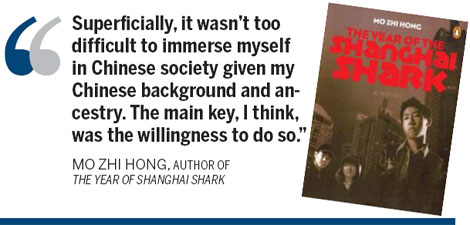First-time lucky for global nomad
By Zhang Kun (China Daily)
Updated: 2010-04-02 10:31
 |
Large Medium Small |

When asked why he left his job as a software developer in New York, moved to Dalian to be an English teacher, and wrote his debut novel about contemporary China, global nomad Mo Zhi Hong answered simply: "Because I'm Chinese".
The Commonwealth Writer's prize-winner talked with readers at the Shanghai International Literary Festival (SILF) last month, discussing with moderator Stephen McCarty about his debut novel The Year of the Shanghai Shark, which won the Best First Book in the South East Asia and the South Pacific region of the 2009 Commonwealth Writers' Prize.
The book is a loosely structured account of a teenage boy in Dalian, Liaoning province, about the people and life changes around him. Living with his professional pickpocket uncle, Hai Long roams the city observing people and learns about their disillusion, anxiety and aspirations. "It is written from the point of view of a youngster, because that is a period when one's ideas, personality and values are formed," Mo says. "I wanted to show how external forces shape Chinese kids today."
Born in Singapore to a three-quarter Chinese family (his father is half Vietnamese), Mo has spent the past 34 years in Singapore, New Zealand, the United States, the Chinese mainland and Taiwan. During the 1990s dotcom boom, he worked as a software developer in New York, but got bored and decided to return to China. He found a job in Dalian, teaching English to students of all ages in a language school. During his stay in China, he experienced the SARS epidemic, witnessed the social changes that occurred as the economy developed, and observed the life of many Chinese people.
While most expatriates in China are satisfied with the white-collar high-life, Mo dug deep into the underbelly of Chinese urban life, learning about the life of professional gamblers, pickpockets, beggars and men who make a living by weighing people on the streets.
"Superficially, it wasn't too difficult to immerse myself in Chinese society given my Chinese background and ancestry," Mo says. "The main key, I think, was the willingness to do so."
Mo says he wanted to re-experience the more unique aspects of the country, rather than those aspects that are, increasingly, of a generic Western nature. "It was interesting to me to re-visit these aspects that I have teenage memories of, and identify and reconcile them with the realities of modern China," he says.
"China is changing. Urban white-collar life is certainly one aspect of that change, and certainly worth examining. It is, however, far from the whole story - not that I claim that my book is either, of course."
Fluent in Chinese and English, Mo chose to write the novel in English because he thought the world would be interested in reading about contemporary China.
Thanks to his background, Mo is able to present today's urban China and its voices with authenticity.
The Commonwealth prize judges' comment read: "This superbly realized world brings us a gallery of eccentric and unforgettable characters the beguiling voice of the narrator draws us into the shifting world of petty crooks, first-world businessmen, tourists, the NBA and McDonald's."
Mo wrote the first draft of the book during his stay in Dalian, and later re-wrote it back home in New Zealand. All the stories are set in Dalian.
Mo is working on a second book, but thinks it's too soon to quit his job as a computer engineer in New Zealand to be a full-time writer.